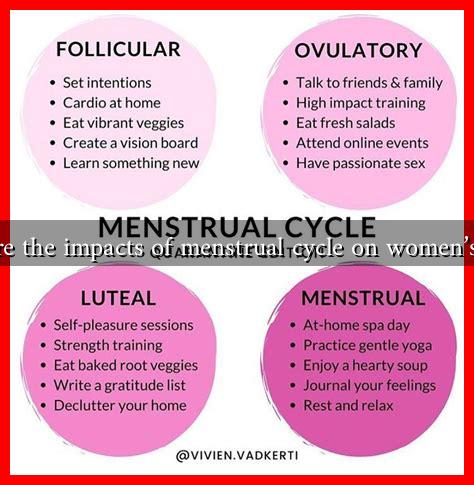-
Table of Contents
The Impacts of Menstrual Cycle on Women’s Mood
The menstrual cycle is a natural biological process that affects women’s bodies and minds in various ways. While many are aware of the physical symptoms associated with menstruation, the emotional and psychological impacts are often overlooked. This article delves into how the menstrual cycle influences women’s moods, exploring the underlying hormonal changes, psychological effects, and potential coping strategies.
Understanding the Menstrual Cycle
The menstrual cycle typically lasts about 28 days, although it can range from 21 to 35 days. It is divided into four main phases:
- Menstrual Phase: Days 1-5, when bleeding occurs.
- Follicular Phase: Days 6-14, where the body prepares for ovulation.
- Ovulation Phase: Around day 14, when an egg is released.
- Luteal Phase: Days 15-28, where the body prepares for a potential pregnancy.
Each phase is characterized by fluctuations in hormones such as estrogen and progesterone, which can significantly impact mood and emotional well-being.
The Role of Hormones in Mood Changes
Hormonal changes throughout the menstrual cycle can lead to various mood alterations. Research indicates that estrogen and progesterone play crucial roles in regulating neurotransmitters like serotonin and dopamine, which are vital for mood stability.
- Estrogen: Generally associated with improved mood and energy levels. Higher levels during the follicular phase can lead to feelings of happiness and well-being.
- Progesterone: Often linked to mood swings and irritability, particularly in the luteal phase when levels peak.
Studies have shown that women may experience heightened emotional sensitivity and mood disturbances in the days leading up to their period, a phenomenon often referred to as premenstrual syndrome (PMS). According to the American College of Obstetricians and Gynecologists, PMS affects up to 80% of menstruating women, with symptoms ranging from irritability and anxiety to depression.
Case Studies and Statistics
Numerous studies have explored the connection between the menstrual cycle and mood. For instance, a study published in the journal Psychoneuroendocrinology found that women reported increased anxiety and depressive symptoms during the luteal phase compared to the follicular phase. Another research conducted by the University of California, San Francisco, indicated that women with a history of mood disorders are more likely to experience severe PMS symptoms.
Statistics reveal that:
- Approximately 50% of women report mood swings during their menstrual cycle.
- About 20% of women experience significant emotional distress that interferes with daily activities.
- Women with pre-existing mental health conditions may experience exacerbated symptoms during their menstrual cycle.
Coping Strategies for Mood Management
Understanding the impacts of the menstrual cycle on mood can empower women to manage their emotional well-being more effectively. Here are some coping strategies:
- Regular Exercise: Physical activity can boost endorphins and improve mood.
- Mindfulness and Meditation: These practices can help reduce anxiety and promote emotional stability.
- Dietary Adjustments: Consuming a balanced diet rich in omega-3 fatty acids, whole grains, and fruits can support mood regulation.
- Professional Support: Seeking therapy or counseling can provide valuable tools for managing mood swings.
For more information on managing PMS and mood swings, you can visit the American College of Obstetricians and Gynecologists.
Conclusion
The menstrual cycle has a profound impact on women’s moods, influenced primarily by hormonal fluctuations. Understanding these changes can help women anticipate and manage emotional disturbances effectively. By employing coping strategies such as exercise, mindfulness, and dietary adjustments, women can navigate the emotional landscape of their menstrual cycles with greater ease. Recognizing the connection between hormonal changes and mood is essential for fostering mental well-being and improving quality of life.

